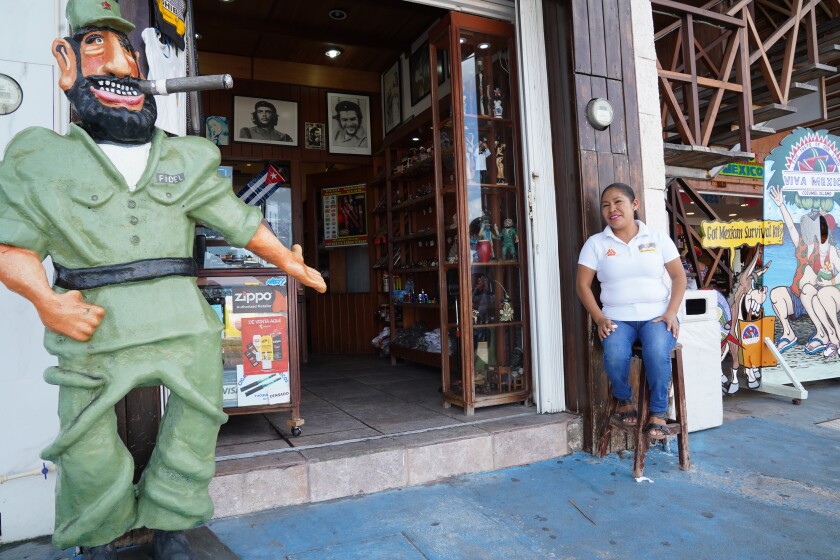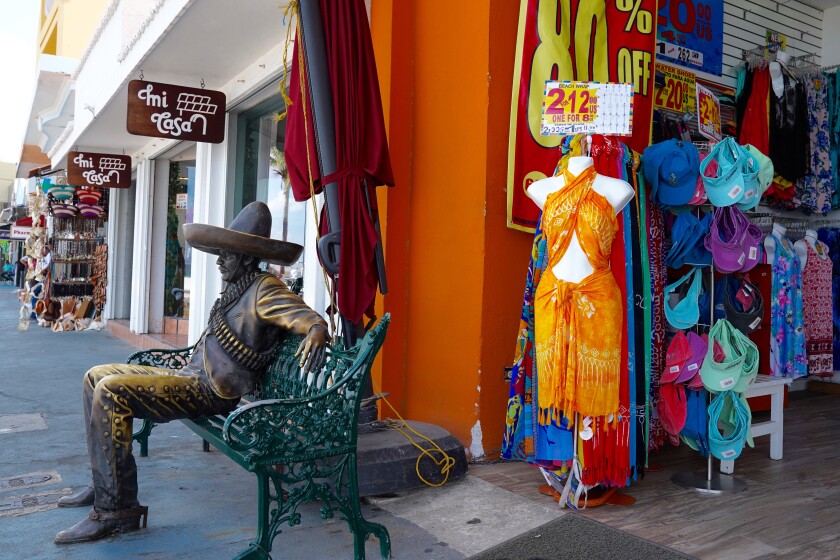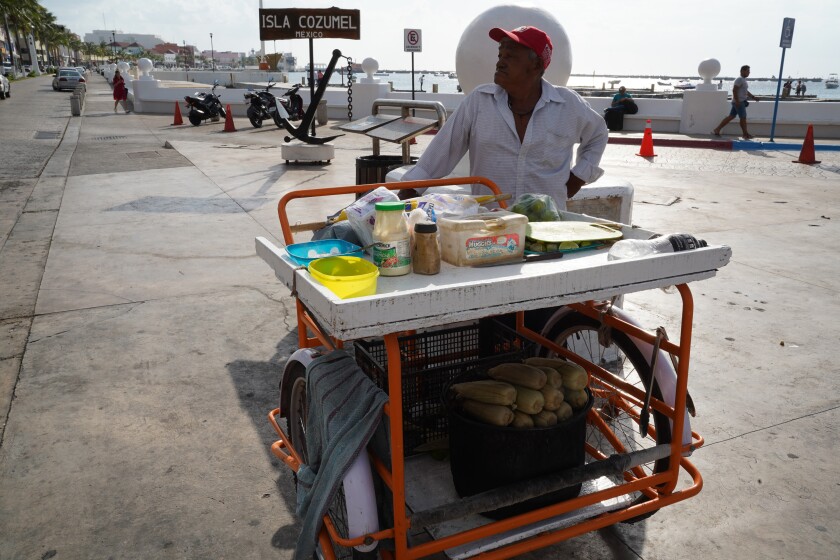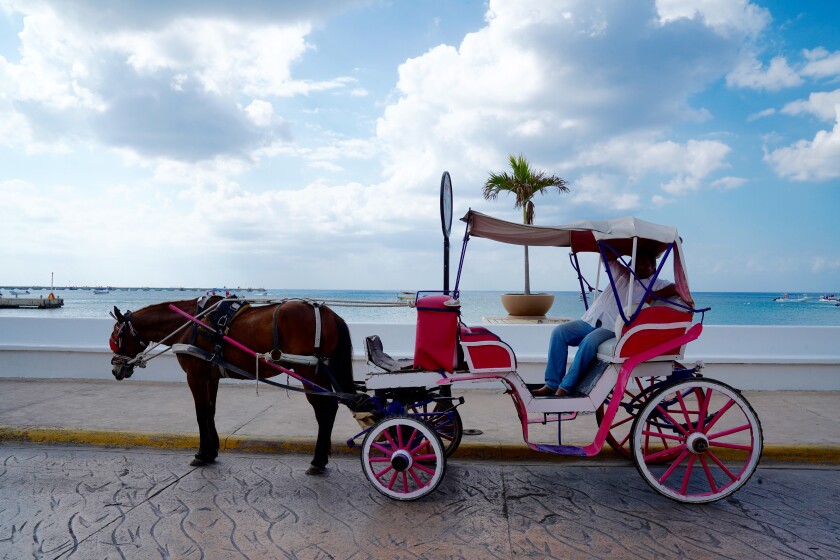COZUMEL, Mexico — Rolex, Cartier and Bulgari were shut down, the Cuban cigar joint was empty, and it just wasn’t happening for the guy hawking shark jawbones.
“We’ve got all kinds of sharks — makos, tigers, hammerheads,” said a frustrated Pablo Ramírez, 23,displaying a malodorous rack of jaws spiked with razor-sharp teeth. “But, right now, there’s no one here to buy anything.”
The swath of azure Caribbean facing his seaside shop told the story: Empty piers and a flat horizon all the way to the Mexican mainland town of Playa del Carmen, 12 miles away.
Not a cruise ship in sight.
There is big trouble in Margaritaville. The collapse of international travel due to the coronavirus pandemic has battered Mexico’s tourism industry, which generated $24.8 billion in 2019, accounting for about 8% of the country’s gross national product.
Few places have been hit more forcefully than here in Cozumel, the renowned resort island off the coast of Mexico’s Yucatan peninsula.

Spring is nominally the height of cruise ship season, and Cozumel is one of the world’s most-visited ports for cruise ships.
Last year, more than 1,300 cruise ships carrying 4.5 million passengers docked here — a record turnout that the island had been on target to surpass this year. The vessels represent Cozumel’s financial lifeblood, accounting more than 70% of the island’s economic activity.
Cruise-line devotees spend tens of millions of dollars annually purchasing everything from high-end watches and diamond bracelets to Mexican-themed trinkets, while also splurging on food and drink.
The threat of COVID-19 has shut it all down.
Cruise lines canceled planned stops this month after authorities identified the big ships as potential breeding grounds for the coronavirus.
Now the boats are docked elsewhere and would-be visitors are at home instead of roaming about the streets, beaches and bars in straw hats and flip-flops. Tourists who arrived on planes and ferries have cut short trips and checked out of increasingly deserted hotels.
“It has been a brutal economic downfall,” Cozumel Mayor Pedro Joaquín Delbouis said at his office in City Hall as the tropical sun beat down on a nearby expanse of palm-fringed Caribbean.
In recent days, merchants have been trying desperately to stay open, offering discounts and doing what they could to attract an ever-diminishing pool of visitors.
“I’m using Clorox to keep everything sanitary,” said Tim House, 42, owner of the waterfront Thirsty Cougar bar and restaurant as he sprayed down the sidewalk on a recent morning. “We have employees who rely on us, and we still have a local clientele base.”

Several days later, the Thirsty Cougar shut down for the crisis, a pattern repeating itself among other establishments.
“This was supposed to be a record month for us — we were totally booked,” said Denise Sánchez, 25, the receptionist at the Aldora Divers, one of many dive shops here offering trips to pristine coral reefs. “Now it has become a record for cancellations.”
Crossed-out names of diving clients who canceled filled the company’s ledger.
Down the street, Ofelia Cruz, 37, bemoaned the lack of customers at her place of work — a Cuban cigar shop featuring a stylized fiberglass statue of Fidel Castro out front, cigar in mouth.
“I have two children, I rely on this job to support my family,” she said. “But I’m not sure the owner will keep it open much longer.”
She could soon be joining the exodus of tourism-dependent islanders returning to family homes on the mainland. At the ferry terminal, a row of idle bicycles normally used to haul luggage attested to the plunge in travel.
“There’s just not enough work now,” said Avelino Alvarez, 54, a luggage-bicycle driver who said he was contemplating leaving the island after 40 years.
Nearby, Francisco “Pancho” Zid, 28, a fisherman, couldn’t find buyers for his fresh catch.
“The restaurants have no business, or are shut down,” he said,
displaying a plastic bag holding three cloudy-eyed specimens on the
town’s whitewashed malecón, or seaside walk.
Times were even rough
for Jesús Pooc, 25, who runs a pharmacy stand along the seaside drag and
had recently scored a stash of one of the planet’s most sought-after
items — pocket-sized containers of hand-sanitizing gel. He was selling
them for about $4 each, a substantial markup but a bargain in troubled
times.
“Someone brought them over from the Sam’s Club on the mainland,” he explained.
Two mega-supermarkets in town were fully stocked, but the aisles were empty. Cruise-ship shoppers never arrived.
Happy hour at Hooter’s was far from cheerful. Waiters with menus stood in front of empty tables, a scene repeated at the nearby Jack’s NY Slice Pizzeria, where a faux Statue of Liberty clutching a slice in her right hand beckoned to nonexistent diners.

The current crash is not Cozumel’s first. The island has suffered previous economic shocks, because of hurricanes and the 2009 swine flu virus, which originated in Mexico. But at a time when Mexico’s economy is already sputtering, uncertainty about how long this pandemic will last has added to a generalized disquiet and sense of alarm.
“The swine flu era was very bad, we were out of work for at least a month,” recalled Gustavo Hernández, 53, a hotel worker. “But that time the government gave us some economic assistance. We don’t know what’s going to happen now.”
Mexican federal and state authorities have vowed to help out the country’s reeling tourist enclaves. But no concrete financial rescue plans have emerged to date.
The precipitous collapse of the economy is evident throughout Quintana Roo, the state that includes Cozumel and the mainland tourist hubs of Cancun and Tulum. Travelers have been ditching reservations and struggling to rebook flights from Cancun back to the United States, Canada and Europe.
“We were planning to go to California, but now we must head back to Europe,” said Darius Darek, 42, a Bonn-based DJ who had been on tour celebrating the 250th anniversary of the birth of Beethoven.
A feeling of gloom, combined with a sense of disbelief, has overtaken this famously laid-back region.
“We in Mexico have survived so many calamities — hurricanes, volcanoes, earthquakes, even narcos,” mused Ernesto López, 42, a taxi driver who was trolling for clients at the near-abandoned ferry terminal in Playa del Carmen, across the strait from Cozumel.

“When a hurricane hits, at least you know: It’s over in a day or so, there is a period of reconstruction, and then things are back to normal. But no one knows how long this depression will last. Today we are all forced to live with the uncertainty of this virus.”
Source: Los Angeles Times
The Mazatlan Post





